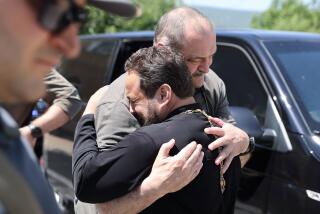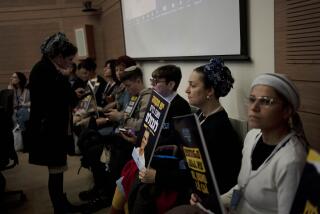Chechen Rebels Add Village to Store of Hostages
- Share via
PERVOMAYSKAYA, Russia — Chechen gunmen played a harrowing game of cat and mouse with their swelling store of hostages Friday, scattering human pawns across this armor-encircled village to raise the stakes for Russian government forces pondering an all-out attack.
The standoff that began Tuesday between the Kremlin and gunmen ready to die for a free Chechnya seemed frozen by both icy winds and hesitation, with neither side giving ground in the stare-down that appeared to leave few alternatives for settlement aside from massive bloodletting.
Helicopter gunships roared low over the ice-bound fields and vineyards as Russian troops in tanks and armored personnel carriers widened their cordon around Pervomayskaya, evacuating women and children from nearby villages in an ominous sign of impending confrontation.
But the nearly 300 Chechen militants, cornered with their captives in this border post just a few miles east of their homeland, scrambled to parry an assault. The gunmen--who fled the scene of one hostage crisis Wednesday only to create another--commandeered private homes for the hostages they had herded here in buses, effectively enlarging their human shield to include scores from this farming hamlet of 900.
Federal troops said they believed that the Chechens had booby-trapped the hostage venues with mines and artillery shells.
The new maneuvers expanded the target that Russian forces had been preparing to hit and made it unlikely that any frontal attack could be mounted without considerable civilian losses.
“It’s much more difficult to storm a town than it is to storm a bus,” said a frustrated Gen. Alexander G. Mikhailov, spokesman for the Federal Security Service and one of the few Moscow officials dispatched to deal with the crisis. “The relocation doesn’t make it harder for us to control the situation, but it makes it harder to free the hostages.”
Sporadic negotiations led by officials of the neighboring republic of Dagestan were reported by local media to have won the release of up to 12 hostages, but no liberated captives were visible from the snow-swept barricades east of the village.
The gunmen loyal to Chechnya’s president-in-hiding, Dzhokar M. Dudayev, were halted by government troops just short of the Chechen border on Wednesday after they released more than 2,000 people they had held captive for 24 hours in the town of Kizlyar, about 40 miles north of here.
*
Chechen guerrilla leader Salman Raduyev led hundreds of angry fighters in a fierce raid on Kizlyar before dawn Tuesday, seizing a maternity hospital and threatening to kill the hostages unless the Kremlin ordered an immediate pullout from Chechnya.
President Boris N. Yeltsin’s crackdown on Chechen claims of independence has deeply divided Russians and poisoned relations between the Kremlin and the West.
As the country lurches toward a June presidential election, the Moscow leadership’s attempts to push the Chechen war into the background have been derailed by the current crisis. Russians have once again been reminded that the Kremlin’s deadly venture into Chechnya has spread the threat of terrorism to every corner of the country.
Interior Ministry forces hugging automatic rifles and shrouded in ski masks against the icy wind appeared to be growing weary of the protracted impasse and impatient with the privations.
Troops at armored checkpoints barring passage at each entrance to the village have even turned away humanitarian workers seeking to check the well-being of the captives.
“They clearly do not want us here,” said Elsa Mathieu of Doctors Without Borders, the French-based medical assistance agency.
She had been able to make a brief visit to the captives a day earlier with a delegation from the Dagestani government, which has been attempting to mediate the crisis. But she described that access as “probably a mistake” on the part of the Russian forces.
More than 100 Kizlyar residents--many of them women and children--were dragged along the escape route by the Chechens as insurance of safe conduct.
Together with the Pervomayskaya residents forced into hosting the captives, the number of hostages is now believed to exceed 200.
Federal Security Service spokesman Mikhailov said residents of Pervomayskaya were feeding and caring for the hostages and that their plight was probably somewhat alleviated.
Meanwhile, thousands of angry Dagestanis massed around checkpoints to rail against what they see as Chechen betrayal.
Dagestan, an autonomous Russian region between Chechnya and the Caspian Sea, has taken in tens of thousands of Chechen refugees fleeing the horror and homelessness inflicted by 13 months of fighting.
With their Tuesday attack on Kizlyar, the Chechen gunmen infuriated the people and government of Dagestan, in equal measure for the bloodshed and the broken bonds of hospitality between neighbors.
“We took these people in to our own towns and villages. We fed them and gave them free medical care, and look what we get in return,” said Ramazan Gasano, a taxi driver from the Dagestani capital of Makhachkala.
Dagestani leaders warned that the crisis here threatened to spread hatred and retribution throughout the Caucasus, where dozens of ethnic groups with histories of clan warfare and violence populate a region that has been impoverished by a decade of economic experiments cooked up in Moscow.
“If conflict breaks out between Chechnya and Dagestan, it will be like another Yugoslavia,” said Abdul Akilo, deputy chief of the Makhachkala City Council and one of those attempting to mediate the deadlocked crisis.
Another Dagestani official, shivering at a crowded checkpoint on the outskirts of this village, accused the Russian federal troops of undermining a peaceful resolution of the incident by blowing up the nearby bridge into Chechnya and blocking the only other routes of escape for the bus convoy.
“We fulfilled our promises, but the Russian generals obstructed this,” said Ali Abdulayev, a member of the Dagestani governing council. “Chechnya no longer considers Dagestan an independent region, but a part of Russia.”
*
Amid growing concern for the hostages’ health, prominent politicians and ordinary citizens alike volunteered to change places with the captives.
Chechens disgusted with the rebels’ actions reportedly gathered outside the government building in their capital, Grozny, to sign up as replacement hostages.
The Itar-Tass news agency reported that the volunteers “say they want to cleanse the Chechen nation of the disgrace brought upon it by the [militants’] act of terrorism.”
And in Moscow, liberal politicians Grigory A. Yavlinsky and Yegor T. Gaidar agreed to rebel demands that they accompany the convoy to Chechnya as volunteer hostages.
“I am ready to fly there immediately,” Gaidar said. “If there is a chance to free the women and children, it would be a sin not to use it.”
The Chechens had also demanded that Russian generals Boris V. Gromov and Alexander I. Lebed join the human shield.
Gromov rejected the idea, telling the rebels: “Not one normal-thinking person would even want to stand close to you while you’re holding women, children and elderly people,” Interfax reported. Lebed, who plans to run for president, refused to negotiate with the Chechens.
*
As anti-Chechen wrath swelled across the country, two Russian lawmakers accused Yeltsin of inflaming ethnic tensions, especially along the volatile Chechen-Dagestani border.
“No normal, mentally sane, reasonable politician, let alone the president of a great country, can afford to pit people against one another,” parliamentary representative Konstantin Borovoi said. “This is a crime.”
Borovoi, who visited Chechen separatists in their mountain hide-outs this week, also warned that terrorist acts will not end until a political settlement is negotiated.
“War is in progress on the entire territory of Russia,” he said. “We in Moscow are in a state of siege. We too are hostages. . . . This is very dangerous.”
Borovoi urged Yeltsin to negotiate, instead of pouncing on the rebels with force. “The Chechens respond with terrorism to terrorism, with crime to crime,” he said. “Let us stop this vicious circle. Let us not enact the next crime.”
Times staff writer Stephanie Simon in Moscow contributed to this report.
(BEGIN TEXT OF INFOBOX / INFOGRAPHIC)
Drama Drags On
The hostage crisis began Tuesday, when the gunmen seized about 2,000 people in the Dagestani town of Kizlyar, The rebels were blocked Wednesday in Pervomayskaya as they tried to return to their homeland. They remain there, encircled by Russian troops.
More to Read
Sign up for Essential California
The most important California stories and recommendations in your inbox every morning.
You may occasionally receive promotional content from the Los Angeles Times.














